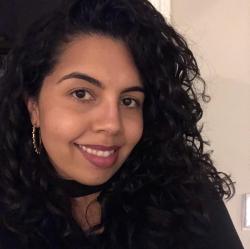
Motherhood is colossal, immovable. Time must absolutely be carved out for it if you want to do this job well. And what of writing? Whenever I learn a writer is also a mother, something inside me jolts. As I wrangle my two children, watching other mothers with successful writing careers feels almost like a revelation: this is all possible!
There are many mother-writers I admire – but I will list only a few here. The great Toni Morrison was a mother of two. Author Angie Cruz, who granted me the opportunity to write this essay, is a mother. Author Jhumpa Lahiri is a mother. One of my mentors, children’s book author Monica Brown, began writing creatively when her daughters were very young and is still rocking the industry. And my boss, Kelly McBride, is a writer, media ethicist – and a badass mom.
How do they do it? I reached out to a few mother-writers who I admire – published authors who are doing the difficult yet rewarding job of raising children. I wanted to understand their approach to mothering and writing. Perhaps they weathered the same tensions I am experiencing. If there was a key to this madness, I hoped to learn it. Was I missing something? Could I write and mother and still come out in one piece – happy and fulfilled, and having created something I’m proud of?
How to be a Mutha Effing Writer, Step #1: Accept that time (and times) are different. Celebrate rather than admonish yourself.
Naima Coster, a New York Times bestselling author of two novels, was pregnant with her daughter in 2018 when she managed to finish drafting her second novel, What’s Mine and Yours, before her due date. I was very impressed when I heard her sharing this nugget during an interview while promoting the book published in 2021 by Grand Central Publishing.
“I had been told by other writers I know who are mothers that I would write again, and to take it easy and not panic, but I had a lot of trouble taking that to heart,” Coster told me last summer over the phone. “I felt this urgency about getting as much done as I could before my daughter was born.”
Factors, as they tend to do, played a role. Coster said she was fortunate at the time to have more time to write. She was teaching part-time and was able to focus more energy on her book. Though the timeline worked out for Coster, she admitted to struggling.
“I think one of the things I’m trying to learn now – as a writer and a parent – is how to cultivate more patience for myself. To work and to work hard, but to accept that my pace is different now and to give myself space,” she added. “One of the things I feel like I’ve been learning these last few years is that, with limited time, I still find time to do my creative work… The greater challenge is finding time to take care of myself.”
Hearing about Coster’s experience made me confront a reality: I haven’t fully accepted that my pace is different now. I’m not 21 anymore, with free hours stretched deliciously before me. Mami’s on a time crunch. If I accept this, if I learn to treat my limited time with grace, perhaps I would come to fully appreciate what is left for writing. That I have managed to place short stories in a few anthologies says so much about how I have already used my time. I should celebrate instead of admonishing myself.
How to be a Mutha Effing Writer, Step #2: Don’t wait. The optimal time will never come.
Namrata Poddar, a writer who teaches literature and writing at UCLA, was in the advanced stages of finishing her novel manuscript when she got pregnant. After her son was born in 2018, she forged ahead to complete the manuscript that would later become the novel Border Less, longlisted last year for The Center for Fiction First Novel Prize and a finalist for The Feminist Press’ Meriwether First Book Prize.
I reached out to Poddar after reading her incredible essay for Poets & Writers about becoming a mother-writer. In an email, she told me that to write, she needed mental alertness and some quiet, regular time.
“There is no way I could’ve finished my manuscript if I didn’t have a family-in-law ten miles away from where I live—and also, a part-time nanny whose services we eventually hired, even if childcare costs felt exorbitant and came at the cost of relinquishing health insurance,” Poddar said. “This village of caregivers took turns while my husband and I worked full-time, him from his office, me from home where I worked on my manuscript but also freelanced to help cover our bills.”
The author told me she wrote a solid draft of another book in her early weeks of postpartum, when she was lucky if she got more than an hour of quality sleep at a stretch. She took to typing notes in her phone (something I have done; a go-to for many other mother-writers squeezed within the confines of time).
“My only reason to type on my phone was because I missed my writing life and a self that wasn’t a caregiver to anyone other than my own creative self,” Poddar explained. “The bar was low; the rational mind, without set goals, brought little resistance, and maybe that’s why I could write.”
Her statement felt like a bulb of light for me. I cannot wait for an optimal time or environment to write because that certainly won’t come anytime soon.
How to be a Mutha Effing Writer, Step #3: Acknowledge that being a mother is its own creative endeavor.
For Aida Salazar, the mother-writer journey has been long and arduous. I’ve been following the award-winning author and arts activist for several years and marvel at the strength at which she shares stories about losing her mother and first-born child, a baby girl named Amály Celeste. Salazar later had two more children – another daughter and a son. Her son was born with a heart condition, and so Salazar didn’t write for the next decade or so – only little stories here and there for her children.
“I was busy mothering,” she told me. “People would say, ‘Oh, aren’t you writing?’ And I would say ‘No. You know what? My creative endeavor right now is my children. I’m creating children. I’m creating people.’ It was too difficult to write.”
When her kids were older, Salazar decided to pick up the pen again. She left the children with their father and borrowed money to fly to New York and attend a Latino writer’s conference. It was there that she had one-on-one consultations with people in the publishing industry. Salazar remembered receiving great feedback about her writing for children. During the flight back to California, Salazar wrote the first five pages of her debut middle grade novel-in-verse, The Moon Within.
For years, Salazar homeschooled her children and was with them 24/7. And during that time, she surrendered to them. “I don’t see it as lost time writing. I think I’m a stronger writer because I’m a mother,” she said. “I surrendered to living and experiencing and collecting. Often writers say, ‘You need to have a full well in order for you to write.’ And so I just allowed for my well to be filled. I just allowed for this experience of mothering to inform me as a human being.”
In preparing for that writer’s conference years ago, Salazar said she searched for what work she could show to industry folks. “And when I looked, I – without trying – had found moments to write all of these little stories,” she said. “I used to tell my husband, ‘I’m writing in the spaces, in the fragments that are around.’ That’s where I’m writing. And I pieced some stuff together, and I did it out of love.”
After I got off the phone with Salazar, I was stunned into silence. Her poignant words sunk in. Motherhood does indeed inform us and how we view life. Being with my children should simply be that – enjoying their company and getting all the snuggles in while I can. They collectively bring me joy like no one else can. My tunnel vision on finding time to write has only hurt me and brought me frustration. Perhaps I can adopt Salazar’s approach. It’s not lost time writing. We are living.
Read more on the intersection between motherhood and writing from Amaris Castillo:

Amaris Castillo is a Brooklyn-born journalist, writer, and the creator of Bodega Stories, a series featuring real stories from the corner store. Her journalism has appeared in The New York Times, the Lowell Sun, Remezcla, Latina Magazine, Parents Latina Magazine, and elsewhere. Her creative writing has appeared in La Galería Magazine, Spanglish Voces, PALABRITAS, Dominican Moms be Like..., Quislaona: A Dominican Fantasy Anthology, and is forthcoming in Sana Sana: Latinx Pain and Radical Visions for Healing and Justice. Her short story, "El Don," was a finalist for the 2022 Elizabeth Nunez Caribbean-American Writers’ Prize by the Brooklyn Caribbean Literary Festival and her short story, “The Moon and the Sun,” was longlisted in 2021. Amaris currently lives in Florida with her family. You can follow her on Instagram @amariswriter and read her stories from the colmado at bodegastories.com.







